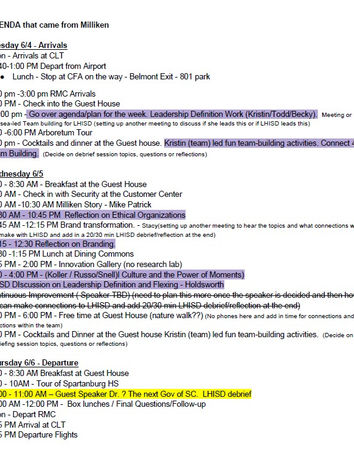LH Hard Truths

The information on this website may not have singlehandedly prevented the district’s financial deficit—but it casts serious doubt on the district’s repeated claim that “everything possible” was done. The data reveals more than a funding shortfall—it exposes a pattern of failed leadership and a troubling absence of integrity. When words like transparency and honesty must be constantly repeated, it’s often because they’re not being practiced. Even a fraction of this data should prompt serious questions—not just about the money, but about the leadership and ethical standards of LHISD over the past two years, if not longer.
How much and where did LHISD
actually cut funding?

Did you know?
While most LHISD departments were asked to reduce their budgets, a few saw notable increases:
-
Superintendent – Elections: +$45,000
-
Communications – Marketing/Comm Special Projects: +$154,000
-
Athletics: +$17,300
-
Career & Technology: +$136,250
At the same time, student programming and staff positions were reportedly cut, the district office created new roles and issued significant promotions—outside of the district-wide staff raises—totaling an estimated $165,000. In previous years, when Human Resources stated that promotions were not being offered, internal promotions still occurred, amounting to approximately $113,000.
One of the newly created positions was in the Communications Department. Not only did this department receive nearly double its previous budget, but it also added staff—while others were scaling back.
Meanwhile, LHISD was eligible for $919,683 through the 2023-2025 Safety and Facilities (SAFE) Grant, but did not to apply. The funds were already allocated to the district; claiming them was all that was required. This grant could have supported safety and security initiatives—one of the focal points of Proposition A.
When asked why the district didn’t pursue the funding, responses varied. One explanation was that staff were unaware of the grant and that LHISD does not employ dedicated personnel to seek out such opportunities. Instead, each department is expected to monitor its own grants. Another response suggested the funding would only last one year.
This raises a critical question: If the district is cutting student programs and essential staff, and claims it lacks resources for roles like grant writers—how is it that nearly $1 million in available funding was overlooked? And how did the district still manage to fund a new Communications position and allocate over $150,000 to that department’s budget—coinciding with a tax election campaign?
A look at the organizational chart shows that many of our highest-paid leaders do not reside in or own property within the district.


Your tax dollars at work
Over the past two years, the LHISD District Office has spent:
-
$91,226 on food and snacks for meetings and miscellaneous gatherings
-
$83,938 on networking association membership fees
-
$318,255 on travel for conferences, training, and professional development
The membership fees alone raise questions. Some staff members hold two or three memberships, with individual's fees reaching up to $700. In a time of budget constraints, why aren’t these memberships being limited—especially when they’re not required for the positions? And if some of these employees earn six-figure salaries, should the district be covering these costs at all?
The travel budget also deserves scrutiny. One trip in particular, taken in June 2024, cost the district $13,700 to fly 21 leaders to South Carolina to visit Milliken & Company—a firm specializing in flooring, textiles, chemicals, and healthcare solutions.
According to the travel forms, not all participants seemed clear on the purpose of the visit. The agenda suggests the trip was still being organized on-site, with most time spent in LHISD-led sessions, breaks, and cocktail hours. Maybe 6 hours were scheduled with Milliken & Company staff?
Most notably, LHISD’s own Travel Procedures & Guidelines—posted on the Business Department website—explicitly list Out-of-State professional development as a non-allowable expense. Yet every travel form for this trip labeled it as professional development, and the CFO approved it.



Honesty & Transparency
Information continually changes - mixed messaging.

The initial "why" in June, which evolved into a guiding principle.
July 2025 Board Meeting
"I just want to re-focus on the budget priorities that have been presented to the board previously and really kind of justify the why we would consider a tax ratification election with our voters." - Rosanna Guerrero
August 2025 Board Meeting
"These were our guiding principles that we worked in in part of putting the budget and the tax rate together..." - Rosanna Guerrero
"...we have less than two months in the bank right now....we do not have enough money to carry us through the end until next September...." - Rosanna Guerrero

Became the "why" just a few months later.
August 2025 Board Meeting
"So why a tax ratification election? The election would generate 10.9 million dollars in net proceeds, which will restore student programs that have been cut, fully fund safety and Security initiatives, and recruit and retain high quality staff and teachers. So, it's a reinvestment in the 10 million dollars that have been cut from the district over the past two years." - Rosanna Guerrero
"Did the "WHY" change because parents wouldn't be supportive, since it didn’t directly impact their children?
Regardless, refilling the fund balance remains a critical issue, especially given the warning that only two months in the bank. Yet, the $10.7 million in newly allocated priorities makes no mention of the fund balance at all.
Information is not always accurate.

Information is selectively shared based on what best serves the district's interests.
LHISD purchased the Higginbotham building in late September 2024, but the acquisition wasn’t publicly announced until December. The district touted the purchase as a major cost-saving alternative to a previously proposed project. So why the delay in sharing the news?
One plausible explanation is timing. At the time of purchase, LHISD was actively campaigning for the 2024 VATRE. Although the building was funded through bonds—an entirely separate financial bucket from operational funds—the district may have opted to withhold the announcement to avoid complicating public perception during the campaign.
Since then, the building has remained vacant. LHISD marked the one-year anniversary of ownership without initiating any visible work. The construction timeline and move-in date remain unclear.
In the meantime, the district is using Maintenance & Operations (M&O) funds to cover utilities for the unused facility. To date, LHISD has spent $3,781.81 on utilities, with monthly costs averaging around $700.


Information is partially true.
On August 6, 2025, KVUE reported that LHISD would be implementing the Raptor Badge Alert panic system. However, Raptor Technologies had already announced the partnership on July 8, 2025.
A concerned community member contacted the district, noting that the announcement hadn’t been shared locally, staff didn’t appear to be using the new technology, and a related safety grant opportunity had been missed. The district initially insisted the concern be addressed in person, but then ceased communication. Only after the community member filed a public information request did the district respond.
Rachel Acosta, LHISD’s Director of Communications, stated:
“The Raptor wearable badges at Bill Burden Elementary School are a pilot program with Raptor. Any opportunity we have to pilot innovative safety features, we try to take advantage of this as it only enhances our student and staff safety. We are not sure why the Raptor website says it is at all campuses. We have sent a message to them and asked them to update it. Thank you for bringing this to our attention.”
This response raised questions, as Ms. Acosta was listed as the point of contact on Raptor Technologies’ original press release, which claimed the system would be deployed district-wide. It seemed unlikely she would have approved the release without understanding the full scope of the project.
Seeking clarity, the community member contacted Raptor Technologies directly. The company responded that, following the inquiry, they had reclassified the initiative as a pilot program and corrected the press release. However, all their other media maintained that the plan was still to equip all LHISD campuses with the Raptor Alert Badges.
The community member also reached out to KVUE but received no response.
One final detail emerged from the public records request: a Facebook post from LHISD’s Communications Department dated July 14, 2025—later deleted—stated:
“Liberty Hill is proud to partner with Raptor Technologies to bring the Raptor Badge Alert system to every campus…”
This raises further questions: Why did Ms. Acosta claim confusion over Raptor’s original messaging when her department echoed the same announcement days later? And if the program was only a pilot, why was it presented as a district-wide initiative in both the press release and the KVUE interview with Interim Superintendent Travis Motal, who had the opportunity, but did not clarify the program’s limited scope?
It should be noted that this initiative aligns with Alyssa’s Law, which requires silent panic technology to be implemented in schools by the 2025–2026 school year. Given that LHISD received and used the 2022-2024 Silent Panic Alert Technology (SPAT) Grant to meet this mandate, the current pilot program raises questions about necessity. If the district is already facing financial strain, why take on additional initiatives it may not be able to afford or sustain? Much like the SparkCognition safety software. Are they requesting funding for programs not yet in place—raising concerns about how ongoing costs will be covered?
Kendall Carter
Board Member
"What I'm saying is, if we take some of this out, take specifically, take the overages out. Take the allowances
out...That's money in our pocket..."
(Regarding VLK service fees for the future Service Center)
If we're this concerned about $6,000 in service fees, why isn't there the same concern over utility costs for a vacant building?
Chris Neighbors
Board Member
"Please email, PM, or call and we can set up a chat."
(Responding to a parent on Facebook)
Why is this the go-to response from every representative of LHISD? Sure, Facebook isn’t the best place for meaningful dialogue, but the district isn’t exactly setting a better example. Every rep seems intent on getting people alone in a room—where no one else can hear the conversation or challenge the narrative. If that’s their idea of honesty and transparency, I’m not sure what is.
Even at board meetings, so-called town halls, or other 'information sessions,' you still don’t get real answers. If they’re uncomfortable with the question, they hand you a QR code to submit it instead—promising to answer it later and post it to a FAQ sheet. That’s not dialogue. That’s deflection.
Megan Parsons
Board Member
“When the district has to balance the budget due to lack of funding, things get cut. "Fun things" are the first to go, same as in a household budget.”
(Responding to a parent on Facebook who mentioned that a district employee told his student that field trips were cancelled because the school was out of money)
So it's acceptable to cut learning experiences outside the classroom for students, yet district staff can still freely spend on conferences and cross-country trips that aren’t essential to their jobs?







